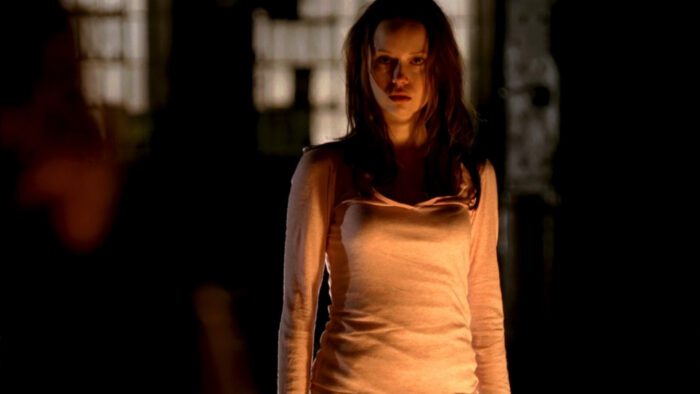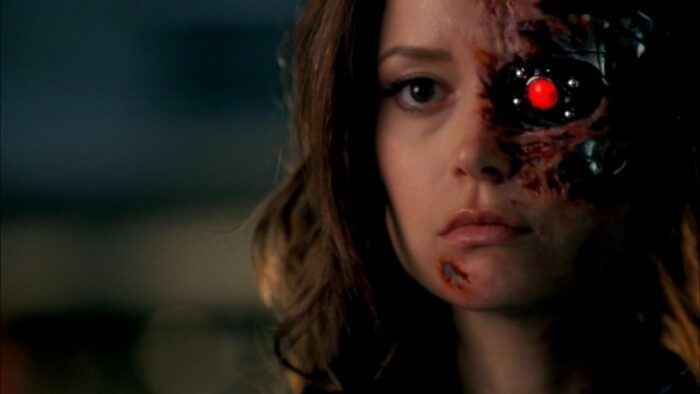I was privileged to watch the first episode of Terminator: The Sarah Connor Chronicles when I attended my first and only Comic-Con in the summer of 2007. The show seemed interesting enough. I was a fan of the Terminator films, but I cannot overstate how little of a chance I originally gave this show.
Let me be clear about where I stood on the franchise at that point. Like most, I believed the first two James Cameron-directed films were everything. A complete story was told, and I didn’t believe we needed to follow Sarah, John, or any other human or machine after Terminator 2: Judgment Day ended. That said, I liked Terminator 3: Rise of the Machines, particularly the final few minutes, which most definitely put an end to the story.
However, that night, I sat in my seat a bit stunned as I watched the show for the first time. This was not something lesser, like a lot of other TV shows that were based on movies. It looked and sounded great. This truly was The Terminator, just in TV form. Given how many TV series are related to various franchises in the film world nowadays, it’s important to note that at the time this show was released, that wasn’t a regular thing.
Also, this show wasn’t a cheaper version of what was seen in theaters. I knew it had to be, but it didn’t look cheap. Ultimately, I’d say that about half the episodes from the series look pretty incredible for being a show on Fox in the late 2000s. The other half doesn’t feature a lot of effects, though. These episodes tend to focus on the main characters rather than the plot.
It was all the better for it. It might not be saying much, but The Sarah Connor Chronicles was the best T2 sequel. Personally speaking, I really like the series’ main players.
Lena Headey’s Sarah Connor is basically all the quiet moments Linda Hamilton gave us in T2 times ten. Often, Sarah doesn’t say much, instead letting her face do a lot of the talking. Throughout the show, we see the downtime between fighting terminators, and we actually get to see Sarah do her damnedest to be a mom to John.

Speaking of which, John (played by an underrated Thomas Dekker) goes through quite the arc from the first episode of Season 1 to the finale of Season 2. He begins the series as an extension of Edward Furlong’s John from T2, smart and quick but also a bit obnoxious and, well, a teen. As he becomes more exposed to the constant realities the series puts him and those around him through, he comes to understand two truths:
1) Those who believe in John Connor are willing to do whatever it takes to ensure his safety, even if that means dying.
2) Try as he might, the future is not something John can run away from or ignore.
By the series’ untimely end in “Born to Run,” John has accepted who he is, even as his relationship with a terminator named Cameron (get it?) becomes even more complicated than it already has been.
Cameron (Summer Glau) is a terminator, not unlike the T-800 sent back to protect John in T2; however, there is a main difference. She looks like a teenage girl, and the series really utilizes this regarding her relationship with John. At times, Cameron can speak like a “normal” person, while other times she’s the classic stoic machine.
Because she’s capable of doing both, she messes with the characters’ expectations throughout the show, which never sits well with Sarah, who never ends up trusting Cameron. John, on the other hand, does, mainly because of his previous relationship with a terminator sent to protect him, but also because of the way Cameron looks and sounds.
In the Season 2 premiere episode “Samson and Delilah,” Cameron’s programming briefly comes undone and she goes after John and Sarah. When the two end up pinning her between two trucks, she begins pleading for John to not shut her down, claiming that she’s better now. She screams and cries for John to not do it. It freezes him, even as his mother shouts at him to do it.
Their relationship never recovers, because how could it? Is it possible that her new directive to protect John rather than kill him returned, or since John knows she can lie very well, is she faking it?
If she is faking it, there would have to be a reason. How could she go from hunting him and Sarah down to playing the long game to get something else out of them?
Of course, it’s entirely possible that she did revert back to her new programming, but perhaps it has nothing strictly to do with protecting John. Maybe protecting him is a means to an end. After all, in “Born to Run” Cameron ends up escaping to the future with some important software, leading John to follow her there. It’s one of the many loose ends that has always bothered me whenever I think about the show. Exactly what was the payoff going to be concerning Cameron?

More than that, in the final minutes of “Born to Run,” as John finds himself naked and alone in the future, he meets some of the show’s familiar faces, but they don’t recognize him. In fact, no one has ever heard the name, John Connor. This obviously implies that something has happened in the past to drastically change the future.
Again, it bothers me that we’ll never get any kind of development here. It’s like watching a trilogy of films, and then the studio decides to not make part three, even though part two has an insane cliffhanger.
Consider how showrunner Josh Friedman managed to rewrite the story set up from the original films before the likes of Terminator: Genisys and Terminator: Dark Fate did. Throughout Season 1 and Season 2, we knew small things could get affected through time travel. A character responsible for the return of Skynet could be killed in Season 1 and ultimately replaced with someone else to ultimately bring forth the rise of the machines.
This was something entirely different, though. Just what exactly happened to have John Connor’s legacy erased? What did Cameron have to do with this, if anything? Also, what the heck was up with Catherine Weaver (played with impressive resolve and malice by Garbage-frontperson Shirley Manson)?
Introduced in Season 2, Weaver was a T-1001 who took the place of a CEO of a high-tech corporation. We know she was developing an AI that could understand the cost of human lives and that the very AI she was using was a computer that was supposed to be the foundation to Skynet. However, it turns out that this computer (referred to as “The Turk”) was not Skynet, and that Weaver hoped to utilize it as a means to fight the machines.
Did she want to stop Skynet for the benefit of humanity? Perhaps there are warring factions of machines and AI in the future. Who knows? All we know for sure is that in “Born to Run,” she saves John and Sarah’s lives when she could’ve easily ended them. That said, she initially goes to the future with John and ends up quickly abandoning him. Is it because John is useless to her, and she’s off to do her thing elsewhere?
Terminator: The Sarah Connor Chronicles ended with several dangling threads:
1) Why doesn’t anyone know who John is in the future?
2) What was Cameron’s mission all along?
3) Just what was Catherine Weaver up to all this time?
4) Sarah has been recently diagnosed with cancer. What becomes of her in the present, given that she was busted out of jail in the Season 2 finale?
This doesn’t even cover James Ellison (a former FBI agent who just wants to know what the heck is going on with Sarah, John, and all of these machines) or Agent Auldridge (an FBI agent introduced in “Born to Run,” who seems to believe Sarah’s stories about machines from the future). These two would have most likely become important to Sarah in Season 3, given that she’s kind of all alone. Rather than going to the future with John, she chose to stay behind. What would’ve been the consequences of that choice?
Had the show continued, I would’ve loved to have seen, if not resolutions to these plot threads, then further development of them. Personally, I needed more on Cameron.

In my opinion, Summer Glau played the first interesting terminator since the T-800 in T2. We know that she’s a liar, but why? More than that, though, in the Season 2 episode “Allison from Palmdale,” we get to meet Allison Young. She was the young woman Cameron was based on, and Cameron seems to have had Allison’s memories implanted in her.
Why?
Now, first of all, seeing Glau’s performance as Cameron/Allison in the present and Allison Young in the future in “Allison from Palmdale” is a treat. She nails the subtle and not-so-subtle differences so well that I wish I could’ve gotten more stories with Cameron and Allison. Given how John meets Allison when he travels to the future in “Born to Run,” I would’ve gotten my wish.
Going back to that question, though, I have a theory.
John would’ve fallen in love with Allison over the course of Season 3. We’d end up seeing Allison’s death again (we saw it in “Allison from Palmdale”), and Cameron would’ve tried to infiltrate; hence, why she has Allison’s memories. This would’ve inadvertently caused her to fall for John, though, and to borrow my brother’s theory, she would’ve taken over the resistance once John died.
You see, in the two-part episode “Today Is the Day” from Season 2, a character named Jesse demands to see John, only to be told by Cameron that she herself will deliver the message:
Jesse: How many times do we have to go over this?
Cameron: Until you give me the answer.
Jesse: Not you. Take me to Connor.
Cameron: You can tell me.
Jesse: No. The liquid metal thing inside the box, it came to me before we escaped. And it gave me a message for John Connor. For him. Not for you.
Cameron: Telling me is the same as telling John.
Why isn’t John in this scene? Is it a case of Thomas Dekker not being available that day? Perhaps the show couldn’t afford the prosthetics to make Dekker an older man. I don’t believe in either of these possibilities. This scene existed for a reason beyond the events of this episode.
Am I reaching? Given the ending of Season 2, I don’t believe so. Cameron is keeping something from Jesse, and we already know that Cameron can lie. Just what the heck is she up to?
This is just one example of something I would’ve liked to have seen, but alas, it’s forever head canon. It could have been worse. The show could’ve devolved into nonsense. Perhaps having just these two seasons keeps it alive for me.

Plenty of series outstay their welcome, and it’s easy to say something we liked that got canceled after one or two seasons means that we were robbed of something with potential. Still, as much as I appreciate the post-TV Terminator films, they don’t even come close to the storytelling on display in The Sarah Connor Chronicles.
Was the show perfect? No. It existed during the last stages of mainstream TV when 23 episodes a season was standard. Had Season 2 been half as long as the first season, we wouldn’t have stand-alone episodes that don’t move the plot forward. The show could be rightfully considered slow from time to time. That said, I love episodes like “Alpine Fields” and “Self Made [sic] Man.”
Josh Friedman was upset when the series got canceled, and I don’t blame him. He’s given us a few documents via Twitter, which were created before and during the show, but he’s never explained how he planned to end the series post-Season 2. It’s a shame. Then again, as I said before, perhaps it’s better this way. The stuff in my head could maybe be better than what Friedman planned.
Still, it would be nice to have that ending. As we know, though, the Terminator franchise will never end. It will simply begin anew and then stop, only to continue that cycle until the end of time. Skynet will always take over, and humanity will always fight back. Perhaps it’s inevitable that an ending is not in sight.


The reason no-one had heard of John Connor when skips forward, past Judgement Day, is because John Connor removed himself from history by doing so. He wasn’t around for those elapsed years BECAUSE he’d leapt forward in time.